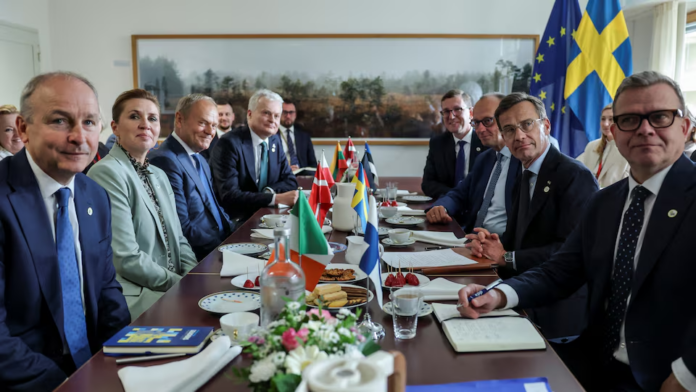European Union leaders will tell the European Commission on Thursday whether they prefer to reach a fast trade deal with the United States under Washington’s terms or continue negotiating for a more balanced agreement.
Most EU governments now appear to support a quick deal, according to officials and diplomats. This would allow the bloc to move forward with its own rebalancing measures if the deal remains unfavourable.
EU leaders are meeting in Brussels just under two weeks before the July 9 deadline set by U.S. President Donald Trump.
The European Commission, which handles trade talks on behalf of the bloc, has proposed cutting tariffs on industrial goods to zero and increasing EU purchases of U.S. liquefied natural gas and soybeans. The U.S. has not shown strong interest in these terms and has focused instead on issues such as EU taxes, environmental rules, and platform regulations, which the EU does not want to change.
The United States currently imposes a 10% tariff on most EU goods and higher rates—up to 50%—on steel, aluminium, and automobiles. Trump has said these tariffs could increase further if no deal is reached.
The only completed U.S. trade deal so far is with Britain, which still faces the same 10% baseline tariff.
German Chancellor Friedrich Merz and Belgian Prime Minister Bart De Wever voiced support for a quick deal, saying it would prevent deeper trade tensions. De Wever said if the deal results in unfair U.S. tariffs, the EU must respond with targeted countermeasures.
The EU has approved but not yet applied tariffs on 21 billion euros of U.S. goods and is discussing a second package affecting up to 95 billion euros more. Possible rebalancing options include a digital advertising tax, which would affect major U.S. tech companies and reduce the U.S. services trade surplus with the EU.
Some 23 of the EU’s 27 leaders will arrive at the summit after attending a NATO meeting in The Hague. Many are reluctant to follow diplomatic talks with economic conflict.
One diplomat said some EU countries are willing to accept the 10% tariff baseline to protect their industries.
On the sidelines of the summit, leaders will also work to resolve objections from Slovakia and Hungary over the EU’s plan to stop Russian gas imports by the end of 2027. These two countries are blocking the EU’s 18th sanctions package against Russia.
Slovak Prime Minister Robert Fico said he would ask for a delay in the vote until Slovak concerns are addressed.




